 Giuseppe Verdi |
SATURDEE OPRY
LINKS |
 Giacomo Puccini |
 Giuseppe Verdi |
SATURDEE OPRY
LINKS |
 Giacomo Puccini |
|
Saturdee Opry Links # 138: Ukraine Edition
This edition of Saturdee Opry Links is more or less keyed to the
incomprehensible horror in Ukraine.
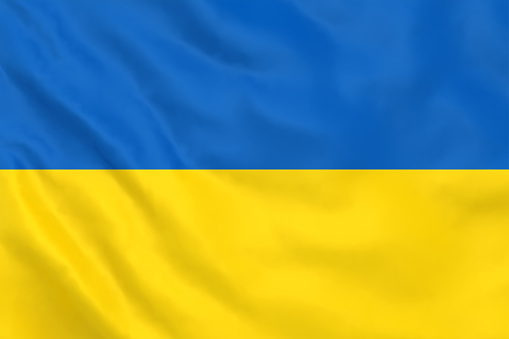
WIKIPEDIA: The
national flag of
Ukraine has two equally sized horizontal bands of blue and
yellow (Constitution
of Ukraine,
Article 20). The combination of blue and yellow as a symbol of
Ukrainian lands comes from the flag of the
Kingdom of Galicia–Volhynia used in the 12th century. As a
national flag, the blue and yellow bicolour has been officially
used since the 1848
Spring of Nations, when it was hoisted over the
Lviv Rathaus. It was officially adopted as a state flag for the
first time in 1918 by the short-lived
West Ukrainian People's Republic and subsequently used by the
Ukrainian People's Republic. When Ukraine was part of the
Soviet Union, the flag was outlawed and, before 1949, there was
no official state flag until the adoption of the red-azure
flag of the Ukrainian SSR. The blue and yellow flag was
provisionally adopted for official ceremonies in September 1991
following
Ukrainian independence, before finally officially being restored
on 28 January 1992 by the
parliament of Ukraine.
Verdi, "La Forza del Destino." Toscanini and NBC Symphony https://www.youtube.com/watch?v=9JQvyg3kJ54 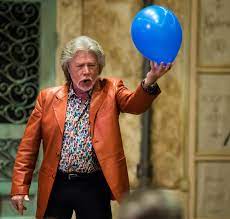
 Samuel Ramey Joyce Di Donato 
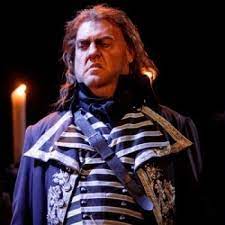 Callas readying for publicity photos Bryn Terfel as Scarpia for recording of "Manon Lescaut." 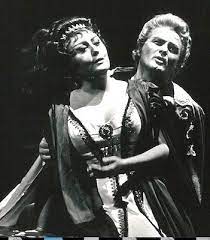
Regine Crespin and
Jon Vickers
1. in Berlioz's "Les Troyens" We open with "La vita è inferno all’infelice," or "Life is a hell to the unfortunate." This aria, from Verdi's later opera, "La Forza del Destino" ("The Power of Destiny"), deals with the character, Don Alvaro, lamenting his lost love, his strange fate---but obviously has universal implications much in evidence today. The tenor is Franco Corelli. https://www.youtube.com/watch?v=klK45Tk6LFc Setting: Italy, near the town of Velletri Synopsis: Don Alvaro, who has changed his name to Don Federico Herreros, is musing on his lost love - Leonora. He decries the fate that befell his parents and denied his royal throne. He has come to Italy as Captain of the Spanish Grenadiers to fight in the army. Translation (scroll down): https://medicine-opera.com/2010/05/la-vita-e-inferno-allinfelice-o-tu-che-seno-agli-angeli/ 2. 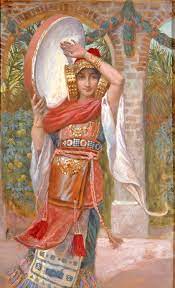 Iphis "Some dire event hangs o'er our heads," sings Iphis in Handel's final oratorio, "Jeptha." A song for our sad time. The story of Jeptha, from the book of Judges in the Old Testament, revolves around Jephtha's rash promise to the Almighty that if he is victorious in battle, he will sacrifice the first creature he meets on his return. Yet this proves to be his beloved daughter Iphis. This recording is from an album by Joyce Di Donato, "In War and Peace: Harmony Through Music." The soprano writes in her album notes: "As human beings, the precious gift of peace comes and goes, but I believe profoundly that it is one well worth nourishing and cultivating at every corner of our lives. It is, in fact, how we change the world — from our very own inner corner outwards. My most sincere hope is that this musical journey will bring you lasting comfort and a glimpse into the possible journey from chaos into peace." https://www.youtube.com/watch?v=06-K4Jv-NKk The words: Some dire event hangs o'er our heads, Some woeful song we have to sing In misery extreme. O never, never Was my foreboding mind distrest before With such incessant pangs. Scenes of horror, scenes of woe, Rising from the shades below, Add new terror to the night; While in never-ceasing pain, That attends the servile chain, Joyless flow the hours of light.
Scenes of horror. .
.
"In War and Peace: Harmony Through Music:---the
album:
https://joycedidonato.com/recordings/in-war-and-peace-harmony-through-music/ 3. Now, for obvious reasons, here is the Hebrew slave chorus, "Va Pensiero" ("Fly, my thoughts") from Verdi's "Nabucco." "Let me cry out with sad lamentation, or else may the Lord strengthen me to bear these sufferings!" This rousing piece, so full of understated resolve and strength, expresses the slaves' determination to withstand and survive. Scholars have long credited the work---which was immediately embraced as a de facto Italian anthem---with helping to unite Italy under one flag. But there is more to the circumstances of the writing of "Va Pensiero." Talk about triumphing over travail, Verdi had just suffered the horrific loss of his beloved wife and children to various illnesses. He had sworn to never write another note of music, yet still had an obligation to write a new opera for La Scala. The director reportedly shoved the libretto (book) for "Nabucco" into Verdi's hand, imploring him to work on it, and when the great composer opened it later, the first words he saw were "Va Pensiero." He said he heard the words singing in his head immediately. At first rehearsal the stagehands shouted their approval, then beat on the floor and the sets with their tools. https://www.youtube.com/watch?v=MBYmhYxEvUM English: Fly, my thoughts, on wings of gold; go settle upon the slopes and the hills, where, soft and mild, the sweet airs of my native land smell fragrant! Greet the banks of the Jordan and Zion's toppled towers. Oh, my homeland, so lovely and so lost! Oh memory, so dear and so dead! Golden harp of the prophets of old, why do you now hang silent upon the willow? Rekindle the memories in our hearts, and speak of times gone by! Mindful of the fate of Solomon's temple, Let me cry out with sad lamentation, or else may the Lord strengthen me to bear these sufferings! Full translation, info: https://en.wikipedia.org/wiki/Va,_pensiero 4. 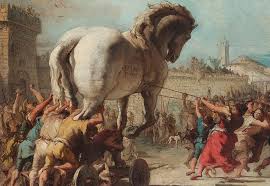 Dedicated to the the million-plus Ukrainian refugees, and the cities they have left behind, probably forever. This is "Adieu, fière cité," from "Les Troyens," by Hector Berlioz. "Farewell, proud city. . ." Sung by the French dramatic soprano, Regine Crespin. Note: the aria begins at 2:48, but is preceded by a declamation, sung by the character, Dido, "I will die, drowning in intense grief." https://www.youtube.com/watch?v=XP8kZPcDVcs Role: Didon, Queen of Carthage and sister of Anna (also known as Dido) Setting: Didon's rooms, Carthage, around 1200 BC Synopsis: After her love, Enée, has left her along with the rest of the Trojans, Didon is filled with overwhelming grief. She now wants only to die. Translation: Farewell, proud city, which a communal effort So rapidly built and made it blossom Farewell my sweet sister who followed me blindly, Farewell, my people, farewell, farewell, hallowed land, that once welcomed my entreaties,
Farewell, beautiful
African sky, its stars that I admired;
Farewell to
endlessly intoxicating nights of ecstasy!
I will see you no
more, my life journey has ended!...
AND here is the translation of the declamation that
precedes the aria:I will die… Drowning in intense grief I will die without being avenged!... Let me die, then. Yes, may he shudder At the distant glow of the flames of my pyre! If there is still something human left in his soul, Perhaps he will weep over my dreadful fate. He, grieve for me!... Aeneas!... Aeneas!... Oh, my soul follows you, Bound to your love, Which, enslaved, it draws into eternal night… Venus! Restore your son to me!... Futile prayer Of a breaking heart!... Until the end, Dido can hope for nothing more than death. ABOUT Ms. Crespin: https://en.wikipedia.org/wiki/R%C3%A9gine_Crespin 5. I was thinking through various operatic characters, looking for an analogue to the satanic maniac of Moscow. I doubt there is one. Scarpia, from Puccini's "Tosca," is about as vicious an operatic figure as I can name. Like Putin, he is a cheap, dirty, perverted little cop grown to monstrous proportion---whose recreations include torture, murder, rape, blackmail, all the "dictator's greatest hits." That's pretty close. Now, Scarpia, chief of police of Rome around 1800, is having a grand time persecuting revolutionaries, including one Cesare Angelotti, close friend of the painter, Cavaradossi. The latter becomes public enemy number one when he hides Angelotti from the police. Cavaradossi, meanwhile, is in love with the famous chanteuse, Floria Tosca, for whom Scarpia lusts. In this passage, Scarpia sings of abandoning God in order to deceive Tosca into rejecting Cavaradossi, so he might have her to himself. This fiendish epiphany occurs, of all places symbolic, inside of a church, where a choir enters, singing "Te Deum," a Latin Christian hymn. Puccini, in utter brilliance, weaves together music of religious piety. . .and sheer evil. (Brings to mind Putin's claim of being a Christian.) Scarpia is sung by Bryn Terfel. With English subtitles. https://www.youtube.com/watch?v=0euYKIMfV4I Translation: https://www.opera-arias.com/puccini/tosca/te-deum/ ANOTHER, from a film version of "Tosca," with Sherrill Milnes. https://www.youtube.com/watch?v=FHOJCdfBFQg 6. 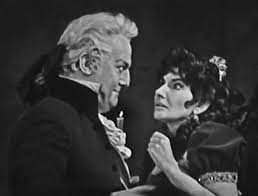 Gobbi and Callas In Puccini's "Tosca" (see post # 5), the Rome police chief, Scarpia, has summoned the singer, Floria Tosca, to his chambers. His plot to drive her away from the painter, Cavaradossi, has failed, and now he resorts to more nefarious means. Tosca arrives, only to hear Cavaradossi's screams of anguish as he is tortured in the next room. Scarpia extracts a promise of sex in exchange for releasing the painter, which he actually has no intention of doing. Tosca agrees, then sings the beloved, heart-rending aria, "Vissi d'arte," asking God how he can be so cruel to one who has never "harmed a living soul." The rape that follows is thwarted by Tosca herself, in an act that every civilized person wishes would befall Putin, who is extorting the world with the threat of nuclear war, as he rapes Ukraine. Here is that full scene, from Act 2 of "Tosca," with astonishing performances by Maria Callas and Tito Gobbi. With English subtitles. 7. 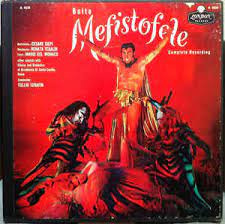 At times such as these---wait a second, there have never been times such as these. Well, at this time, one is torn between antipathy toward humanity, for never having overcome the compulsion to destroy and kill, and. . .deep love of this fragile oasis in cosmic nothingness, the paradise Earth. Here, SOL opts for due condemnation of humanity, in the voice of Satan himself, gloating over the evils and ills that forever plague our sorry species. This, of course, is as cogent a denunciation of evil and foible as can be found in opera, and possibly anywhere, "Ecco il Mondo," from Boito's "Mefistofeles." The sensational performance is by Samuel Ramey. Setting: The heights of Brocken Mountain, medieval times. Synopsis: During a series of Satanic rituals on the mountaintop, a group of witches give Mefistofele a glass globe. He sees the world in it and declares his hatred for it. https://www.youtube.com/watch?v=WSyV3cjWLWY Translation: Here is the world, Empty and round. It rises, falls, Dances, glitters, Whirls about Under the sun, Trembles, roars, Creates, destroys, Now barren, now fecund- Such is the world. Upon its huge And rounded back Dwells an unclean And mad race, Wicked, subtle, Proud, vile, Which lorever Devours itself, From the depths to the heights Of the guilty world. This proud And foolish race, Amid vanities And orgies, Laughs, exults, Merrily, heedlessly, Wealthy, proud, And swells up On the foul globe! Of the guilty world! ITALIAN: Ecco il mondo, Vuoto e tondo, S’alza, scende, Balza e splende. Fa carole intorno al sole, Trema, rugge, dà e distrugge, Ora sterile or fecondo. Ecco il mondo. Sul suo grosso Antico dosso V’è una schiatta E sozza e matta, Fiera, vile, ria, sottile, Che ad ogn’ora si divora Dalla cima sino al fondo Del reo mondo. Fola vana è a lei Satana, Riso e scherno E’ a lei l’inferno, Scherno e riso il Paradiso. Oh per Dio! Che or rido anch’io, Oh per Dio! ecc. Nel pensare ciò Che le ascondo. Ah! Ah! Ah! Ah
Ecco il mondo!
SOL EXTRA! Interview: Samuel Ramey (still with us at 80!)
https://www.youtube.com/watch?v=UE9_sadFlvs
More recent: https://www.youtube.com/watch?v=u0KI-OlPa2M
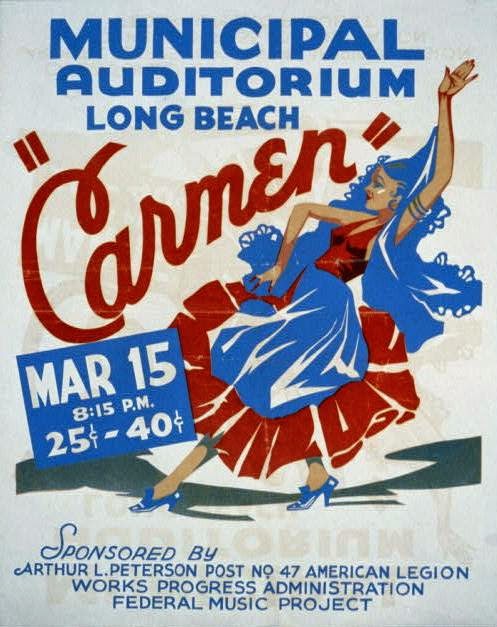
|